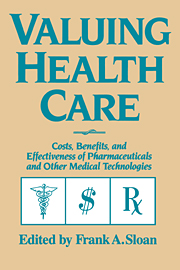 Valuing Health Care
Valuing Health Care Published online by Cambridge University Press: 07 December 2009
The set of virtually unanswerable questions includes the discount rate used for future health status.
Lester Lave, The Strategy of Social RegulationIn any decision-making context in which effects of decisions are generated over time, it is necessary to establish some relative weight on deferred outcomes as opposed to immediate impacts. The task of converting future effects into present dollars by discounting them at some rate of interest is not a process unique to medical decision making. Indeed, all economic decisions in which resource allocations involve an intertemporal element entail some weighting of the effects at different points in time. The main economic question is what weight impacts should have at different times. In particular, how much more highly should current, as opposed to future, impacts be weighted?
Intertemporal aspects are inherent in the medical decision making context as well. The entire notion of investment in human health implies some concern with future well-being. Although strategies for treating headaches and the common cold involve remedies with imminent payoffs, most major medical decisions involve a long-run element (see, among others, Edelson, Tosteson, and Sax 1990; Weinstein and Stason 1977). The communicable nature of AIDS, for example, means potential future beneficiaries. Pharmaceutical products, such as those for treating hypertension and cancer, have long-run effects on future earnings and individual health that require some discounting process (Shibley et al. 1990; Kawachi and Malcolm 1991).
To save this book to your Kindle, first ensure [email protected] is added to your Approved Personal Document E-mail List under your Personal Document Settings on the Manage Your Content and Devices page of your Amazon account. Then enter the ‘name’ part of your Kindle email address below. Find out more about saving to your Kindle.
Note you can select to save to either the @free.kindle.com or @kindle.com variations. ‘@free.kindle.com’ emails are free but can only be saved to your device when it is connected to wi-fi. ‘@kindle.com’ emails can be delivered even when you are not connected to wi-fi, but note that service fees apply.
Find out more about the Kindle Personal Document Service.
To save content items to your account, please confirm that you agree to abide by our usage policies. If this is the first time you use this feature, you will be asked to authorise Cambridge Core to connect with your account. Find out more about saving content to Dropbox.
To save content items to your account, please confirm that you agree to abide by our usage policies. If this is the first time you use this feature, you will be asked to authorise Cambridge Core to connect with your account. Find out more about saving content to Google Drive.